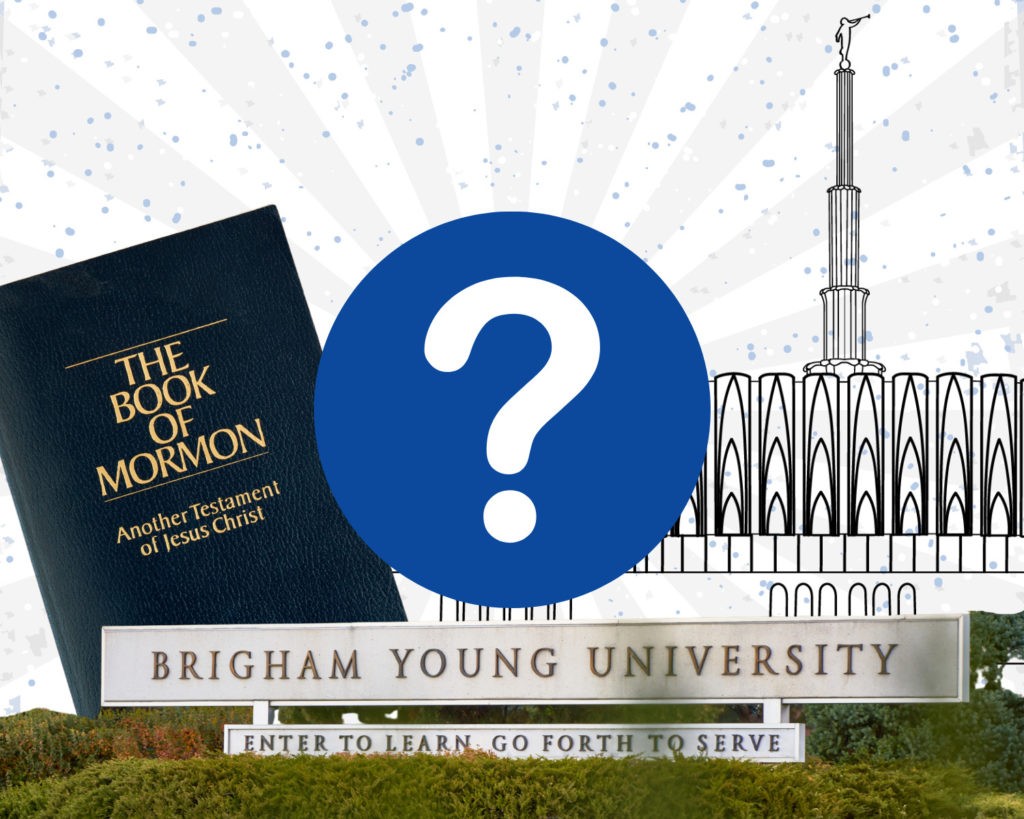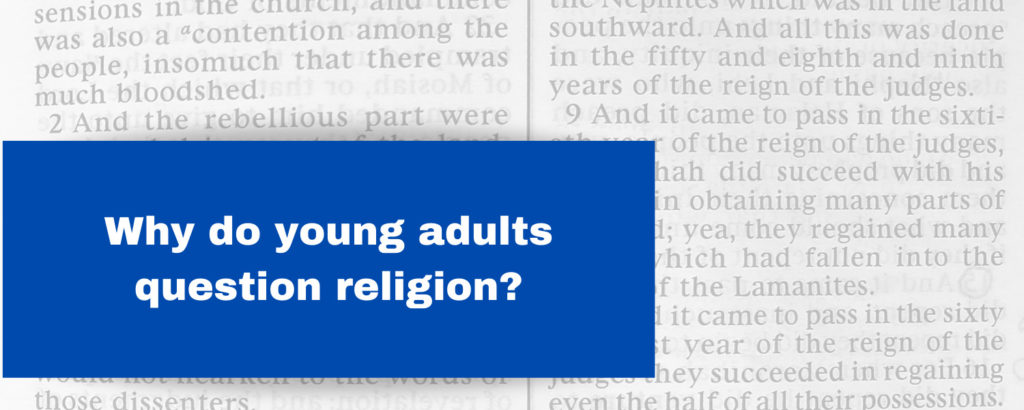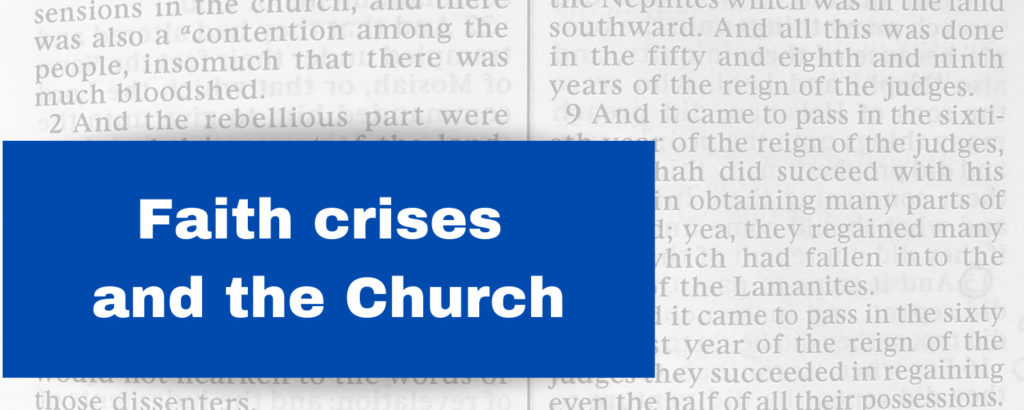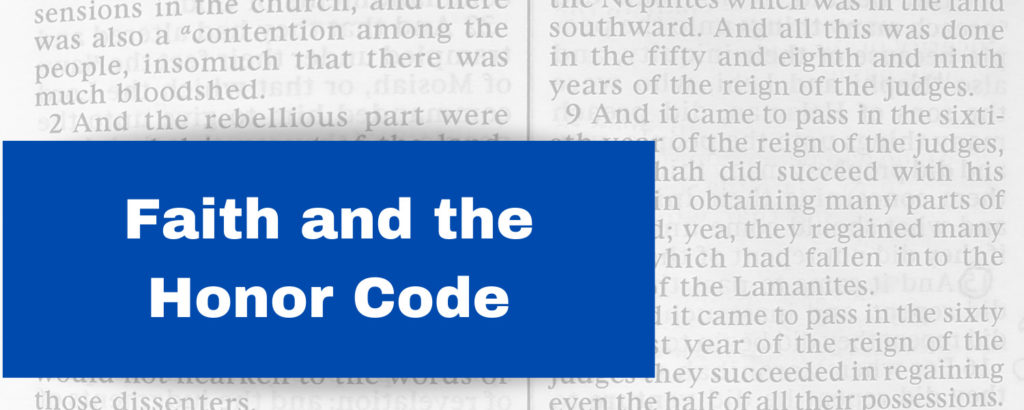See also: How to cope with a faith crisis at BYU

April came to BYU full of hope that her university experience would allow her to learn, serve and thrive, but she didn’t expect to struggle with her faith.
“I have never been thrown into an environment where people nitpicked every part of my faith like what happened during my time at BYU,” said April, who asked to keep her last name anonymous because of the delicate nature of her situation.
A few months ago April, a member of BYU’s sponsoring institution The Church of Jesus Christ of Latter-day Saints, was close to losing her testimony. “I forced myself to have a wakeup moment in which I realized that what matters is that I can’t deny that God exists and as many mistakes as I make and as much as my views and opinions change, I can’t deny the fact that I’ve felt the Spirit and that I know this is real.”
While April said she now feels closer to God than she has in a long time, the process of re-evaluating her faith was complicated by her BYU attendance. “I felt inadequate when I struggled with my faith because the standard was always to be perfect and to never waiver.”
April is not alone in her experience with faith at BYU. She said she has talked to other students about their faith journeys and many asked her to not tell anyone else about their struggles out of fear of repercussions from the Honor Code Office. “I don’t believe BYU has created a healthy environment in which students may question their faith without feeling like they’re going to risk their status at school.”

Faith questioning and changes in beliefs aren’t unique to BYU students. Studies show that general religious involvement is dropping in teens and young adults.
The National Survey of Youth and Religion followed over 3,000 American teens from 2002 to 2012 and examined their feelings and participation in religion over the years. Part of this survey found that weekly church attendance of youth 13-17 dropped from 40% to 20% over five years, and over the course of the study, 48% of respondents didn’t change religion at all. The remaining group either converted, switched or distanced themselves from religion at least once.
BYU psychology professor Sam Hardy said there are a number of developmental reasons teens and young adults are likely to question or leave religion. College-aged youth are more able to think and reason critically than they were as children or teens. “They’re gonna start to pick apart belief systems, including maybe their own belief system, and think critically about it.”
Young adults in college also have more autonomy from their parents, which could lead to a decline in church attendance.
Teen and young adult years also involve some serious identity formation. “They’re trying to decide who they are and who they want to be, or whatever,” Hardy said. “It’s not only critically thinking about their beliefs that they make sense, but deciding if that’s who they want to be.”
BYU Counseling and Psychology Services psychologist Klint Hobbs said individuation and independence is actually a good thing. “That’s an uncomfortable process that we kind of want all of our students to go through so that you know why you believe what you believe.”
This process of forming an identity leads to students being more invested in their beliefs. “That is a sign of psychological health, really kind of questioning and examining, and then coming to more firm conclusions and more kind of personal conclusions,” Hobbs said.
Hardy agreed with Hobbs’ observation. “I would assume (that for) most people some kind of questioning is necessary or at least helpful in really owning it and internalizing it and having a strong testimony.”
Listen to Hobbs explain more about why young adults tend to question religion:

Latter-day Saint young adults might be the exception to the trend found in the National Survey of Youth and Religion. Hardy conducted an informal survey of 500 BYU psychology students a few years ago and found about 80% attended church weekly, compared to 20% in the national survey.
However, in the last year, Hardy informally surveyed another 900 psychology students about their levels of doubt. He found that 36% had no doubts, 11% had many doubts, and the remainder had at least some doubts, showing that doubts are relatively common among BYU students.
A 2016 survey of over 1,500 current and former Church members of all ages found that 49.1% of respondents said they believe all the Church’s teachings. The remaining half believe many or some teachings, while about 5% said they don’t believe most or all teachings.
The survey conducted by Jana Riess, an author with a Ph.D. in American religious history, and Benjamin Knoll, a professor of politics at Centre College in Danville, Kentucky, also found that the average age that respondents left the church was 21, supporting the idea that faith questions often occur in young adulthood.
Hardy pointed to not feeling accepted or engaged, doctrinal or gender issues, and Church history as reasons members leave the Church.
Riess and Knoll’s study also found that relationships with family and friends and church attendance play a role in who has doubts and leaves the Church. “Those who attend regularly and have more Mormons in their social networks are more likely to be believers, while those who attend less regularly and have more non-Mormons in their family and friendship circles are more likely to be doubters,” the study reads.

BYU’s Honor Code states that students and faculty must abide by certain policies in order to attend or work for BYU, including religious policies like regular church attendance. For students experiencing a faith crisis or many doubts, the threat of receiving consequences from the Honor Code Office weighs heavy on them even if they haven’t committed an Honor Code violation.
“There is fear and shame that comes when imperfect people are expected to keep the Honor Code,” April said. “Students expect Honor Code violations to be treated like Christ treats sins, with mercy and a certain ‘curve’ in our performance, while the school certainly does not.”
Fellow BYU student Samantha also fears repercussions from the Honor Code Office while her opinions on the Church and its policies change. “Even though I keep all of the commandments and all of my covenants, I usually feel like I have to have a perfect faith in order to hold my Honor Code standing and my temple recommend,” she said. “It’s really scary, and I feel like I am afraid a lot of the time.”
Samantha, who also asked to keep her last name anonymous out of fear of potential consequences, said she doesn’t open up to others about her feelings often because of that fear.
BYU alumna Chelsea Homer started a private Facebook support group for women experiencing a faith crisis. During the pandemic, the group has grown from fewer than 100 members to more than 1,500. “I started it as a refuge of sorts for women,” she said. “The women range from people who are pretty nuanced or questioning to other women who have left who just don’t know where to go.”
However, that refuge was breached in December 2020 when someone sent screenshots of a BYU-Idaho student’s membership in the group to the Student Honor Office. The student, who asked to remain anonymous, was barred from registering for classes until she met with the office.
“They gave me a warning and told me if I didn’t remove myself from the group then I will have ‘actions taken against me,'” the student told Homer.
After this experience, a handful of BYU students decided to leave the group because they worried something similar would happen to them. “Just the idea of people reporting or taking screenshots of really vulnerable things is scary,” Homer said.
A lot of the fear surrounding the Honor Code and potential consequences from faith crises stems from questions surrounding the office and what constitutes a violation of requirements like “participate regularly in church services.”
BYU Honor Code Office Director Kevin Utt said there is no “rubric” to follow when it comes to how often someone needs to attend Church activities to remain in good Honor Code standing. “As a community of 40,000 people living in an ever-changing environment, there will always exist situations or circumstances that will impact how we participate regularly in Church services.”
Utt did not answer questions about potential consequences a student could receive for failing to attend church services regularly or how the Honor Code Office handles cases dealing with questions of faith because “the Honor Code Office addresses behaviors, not beliefs.”
BYU students and faculty verbally recommit to living the Honor Code in annual ecclesiastical endorsements with a church leader, and according to Utt, these endorsements “can be withdrawn at the ecclesiastical leader’s discretion.”
The ecclesiastical endorsement portal for leaders on a BYU Office of IT Support webpage says “a student who is admitted without being fully worthy is not prepared spiritually and displaces another student who is qualified to attend.” Ecclesiastical endorsements ensure students are living Church standards and are not less active.
According to Utt, the ecclesiastical endorsement has three questions: “Has the student abided by the requirements of the Honor Code? Is the student now abiding by the requirements of the Honor Code? And will the student continue to abide by the commitments of the Honor Code while a student at BYU?”
Utt said BYU exists “to provide an education in an atmosphere consistent with the ideals and principles of The Church of Jesus Christ of Latter-day Saints” and observance of the Honor Code helps create and preserve that atmosphere. But for students like April and Samantha, uncertainty about the Honor Code often creates an atmosphere of fear that is not conducive to the natural, hallmark developmental process of identity formation of young adults.




